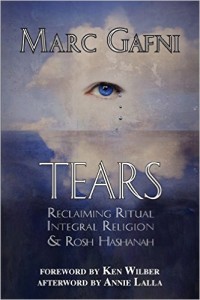Tears in the Mystical Tradition of Cosmocentric Consciousness
 Enjoy this excerpt from Marc Gafni’s Book Tears: Reclaiming Ritual, Integral Religion and Rosh Hashanah:
Enjoy this excerpt from Marc Gafni’s Book Tears: Reclaiming Ritual, Integral Religion and Rosh Hashanah:
Let me tell you a story of holy tears of this kind. A Hasidic story.
Isaac, the Vorker Rebbe, was best friends with another well-known master, Menachem Mendel of Kotzk. They had years earlier made a sacred promise to each other that the one who dies first would visit the other and share the secrets of the higher world. As it happened, Isaac of Vorke died first. Strangely, however, weeks have gone by and Menachem Mendel has received no visitation from his departed friend. Deeply disturbed and worried for his friend, he decides to break with protocol and ascend to Heaven himself to inquire after his friend’s welfare. Arriving in Heaven — the world of Atzilut — through the mystical method of soul-ascension, he searches for Isaac. He searches through myriad realms and palaces, the palace of King David, of Abraham and Sarah, of Joseph and his brothers, of Solomon and Sheba. But wherever he wanders, he is told that his friend Isaac had indeed been there, but he left. “But where could he have gone?” queries Menachem Mendel, and the ancestors respond by pointing in the direction of a vast and dark forest. Menachem Mendel heads for the forest and wanders there for a considerable amount of time (and about what happened in the forest we cannot write in this book).
After a time, he hears the rush of water — the sound of a vast sea — and he follows that sound to the edge of the forest where he discovers his friend Isaac standing by the sea, crying, and defiantly so. They meet and embrace, and Menachem Mendel asks his friend: “Where have you been, why did you not ever come to visit me as promised? And why are you crying?”
Isaac responds: “My friend, look at this ocean and listen. Do you know what this ocean is?” Menachem Mendel, master of Kutzk, inclines his ear and his heart and listens. The sounds of the ocean make him shiver; sending a deep chill up his spine, and an overwhelming, unbearable sadness threatens to suffocate his heart. No waves had ever done this to him before. But he cannot make out the reason. “Know, my friend,” Isaac explains to him, “that this is the Ocean of Tears. There are tears in this ocean that were rightly shed and tears that were wrongly shed — but I don’t care their cause. I have told God that I will not leave here, I will not hold back my tears — not even to enter Heaven — until God, in love, promises to dry up all the tears.”
This is a story of cosmocentric consciousness — when a human being can love, cry for and work to heal and transform all of reality as the natural and felt expression of his humanity, even at the expense of his own spiritual pleasure. That is outrageous love.
Crying with God and As God, Sacred Texts
But it is even more than that. Outrageous love is when man so loves God that he is willing to cry with God and as God. This is part of the rereading of ritual that transforms our topic of conversation: Rosh Hashanah, the Jewish New Year holiday. Classically this holiday is understood as the solemn day of judgment when the heavenly court declares who shall live and who shall die. God is the all-powerful and perfect king, and we human beings are the imperfect subjects pleading for pardon and reconciliation. Deep within the sources of mystical reading, however, are the resources for re-reading ritual. Enter into the inside of the text, and a deeper consciousness of shocking beauty reveals itself. In this re-reading man and God meet in supreme union as they shed — as one — cosmocentric tears. The human being shares God’s infinite pain and cries God’s tears.
 According to one mystical master, Kalonymous Kalman, this meeting and merging between man and God in the place of tears is the inner mystical secret of shofar, the ritual ram’s horn that is blown on Rosh Hashanah. Shofar blowing is the core ritual of Rosh Hashanah. Classically, shofar is understood as the horns of pageantry that declare divine kingship over all of reality. A second reading that we will unpack, which appears in the sources, re-reads shofar as tears. The nature of the shofar tears will be one of the major themes of our meditation together. But let us for a moment skip the careful steps of the scholar and bring ourselves right to one wildly important and essential re-reading of the meaning of tears. In a profound and ecstatic, painful and beautiful mystical re-reading, the tears of shofar are God’s tears. More deeply still, as we will see in the course of our study, they are human tears which have merged with divine tears. For now, let’s just taste the beginning of this re-reading in the next several pages. I will return to this same material again, in greater context later in this volume.
According to one mystical master, Kalonymous Kalman, this meeting and merging between man and God in the place of tears is the inner mystical secret of shofar, the ritual ram’s horn that is blown on Rosh Hashanah. Shofar blowing is the core ritual of Rosh Hashanah. Classically, shofar is understood as the horns of pageantry that declare divine kingship over all of reality. A second reading that we will unpack, which appears in the sources, re-reads shofar as tears. The nature of the shofar tears will be one of the major themes of our meditation together. But let us for a moment skip the careful steps of the scholar and bring ourselves right to one wildly important and essential re-reading of the meaning of tears. In a profound and ecstatic, painful and beautiful mystical re-reading, the tears of shofar are God’s tears. More deeply still, as we will see in the course of our study, they are human tears which have merged with divine tears. For now, let’s just taste the beginning of this re-reading in the next several pages. I will return to this same material again, in greater context later in this volume.
Kalonymous Kalman writes, “And the voice of the shofar is the voice of God’s tears; as it is written ‘God rises through the Teruah sound, God is within the sound of the shofar,’ meaning that God is aroused through the Teruah — the wailing sound of people sobbing in pain — and responds in kind with Divine tears, the sound of the shofar, which in turn announces the redemption.” The second-century Rabbi Elazar taught, “See how great is God’s compassion. In the moment that he remembers the suffering of [his creations], he turns his back on the attribute of judgment and subdues it and has compassion upon them. This is what is meant by the teaching, ‘God sheds two tear drops into the great sea’ … meaning that when God is reminded of the suffering of his [creations], he sheds two tears of judgment into the great sea, which is the Sea of Wisdom, in order to sweeten them, and transforms the attribute of judgment into the attribute of mercy, and has compassion upon them.”
We wish all our readers a good and sweet year: L’Shanah Tovah U-Metukah. Read more about the transformation of the bitter to the sweet, the movement from separation and suffering to liberation, fullness, Eros and compassion, here>>>
In Evolutionary Love,
The Center for Integral Wisdom Team








